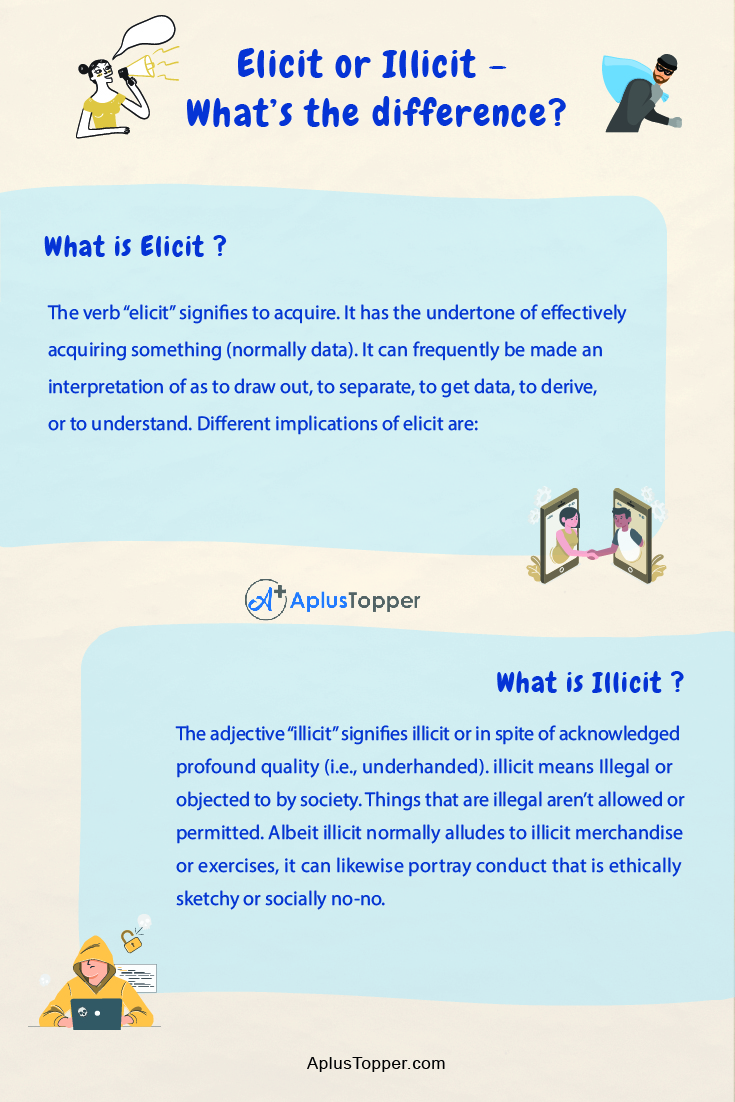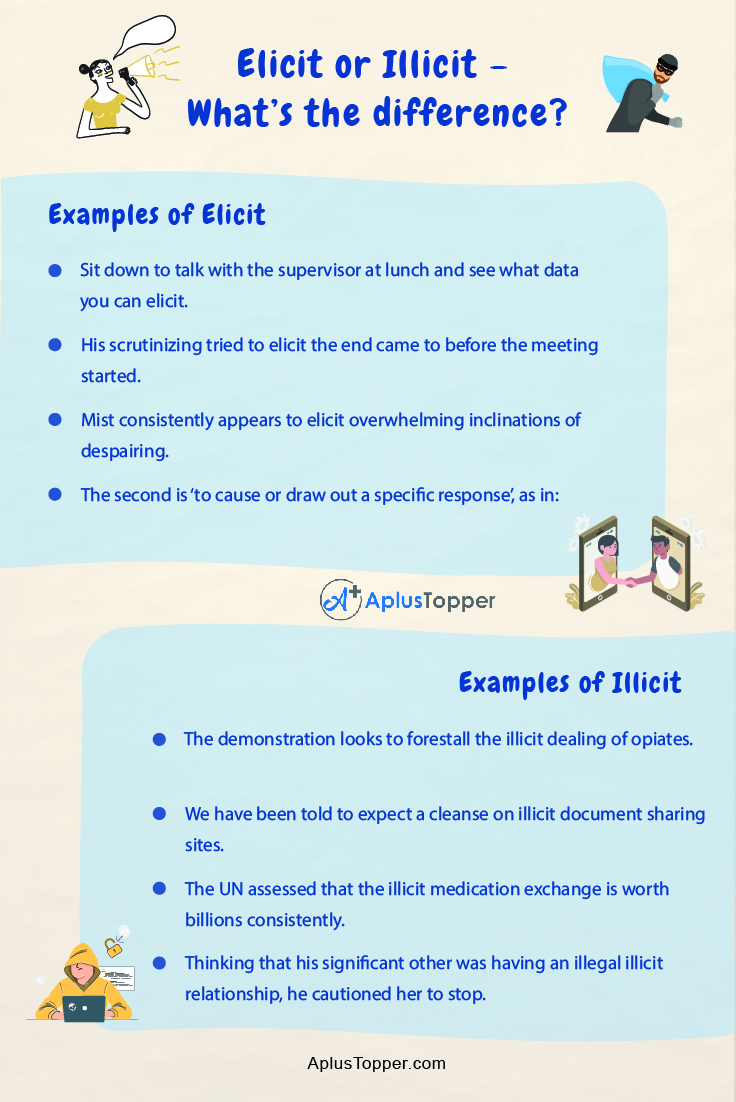Elicit vs Illicit: Elicit and Illicit both the words look and sound similar, but have different meanings. Elicit is a verb word whereas illicit is an adjective word. The meaning of elicit means to get or to obtain something whereas illicit means illegal.
elicit” and “illicit” are various spellings for a similar idea? They appear to be, as indicated by how likewise they are articulated, and to the way that in some way, the two of them allude to something identified with data, in different settings. Appear to be all good? Indeed, it’s not. “elicit” and “illicit” are unquestionably not two forms of similar though – they are not even equivalent words!
Indeed, they are spelt comparably, however, this is only an arbitrary occurrence. On the off chance that “ellicit” is at any point utilized rather than “illicit” or the other way around, the words will surely be incorrectly spelt. They characterize totally various things and are utilized in unmistakable settings. Check these underneath to ensure you are rarely befuddled and never confound your public all things considered.
What is Elicit?
The verb “elicit” signifies to acquire. It has the undertone of effectively acquiring something (normally data). It can frequently be made an interpretation of as to draw out, to separate, to get data, to derive, or to understand. Different implications of elicit are:
- To get or create something, particularly data or response.
- To get an understudy to give or recall a reality, reaction, and so forth rather than letting them know the appropriate response.
At the point when you get a reaction or response from somebody, you bring out or incite it. The reaction can be theoretical or elusive, similar to a feeling, or something more concrete, similar to realities or data.
Examples of Elicit
- Sit down to talk with the supervisor at lunch and see what data you can elicit.
- His scrutinizing tried to elicit the end came to before the meeting started.
- Mist consistently appears to elicit overwhelming inclinations of despairing.
- The consultation elicited some noteworthy declarations from the executive’s associates.
- The second is ‘to cause or draw out a specific response’, as in:
- The greater part of the humour is more miss than hit, however, there are minutes that elicit a laugh.
What is Illicit?
The adjective “illicit” signifies illicit or in spite of acknowledged profound quality (i.e., underhanded). illicit means Illegal or objected to by society. Things that are illegal aren’t allowed or permitted. Albeit illicit normally alludes to illicit merchandise or exercises, it can likewise portray conduct that is ethically sketchy or socially no-no.
Examples of Illicit
- The demonstration looks to forestall the illicit dealing of opiates.
- We have been told to expect a cleanse on illicit document sharing sites.
- The UN assessed that the illicit medication exchange is worth billions consistently.
- The second is ‘conflicting with moral guidelines; illicit or not endorsed by society’, as in:
- Thinking that his significant other was having an illegal illicit relationship, he cautioned her to stop.

Difference Between Elicit and Illicit
The words ‘ellicit’ and ‘illegal’ are homonyms, which means they sound the same however have various spellings and various implications. Furthermore, that, however, these two words additionally have various grammatical features. This alludes to the work they do in a sentence. There are nine classifications of grammatical forms and each word squeezes into somewhere around one of these classifications. They figure out where a word goes in a sentence and how it capacities correspond to different words.
‘Ellicit’ is a verb, or activity word, though ‘illegal’ is an adjective, or a word that portrays or changes a thing. This implies that in case these words are confused with one another, not exclusively will the sentence not check out, it will not be linguistically right.
Ellicit is an verb. It is an equivalent of bringing out, where that word has the significance to draw out. Illegal is an adjective. It implies illicit or in any case prohibited.
Ellicit and illegal are close homophones, implying that they are articulated practically something very similar. This clarifies the disarray for some contemporary English speakers.
A decent memory stunt when settling on elicit and illicit is to contemplate their most normal equivalents. Recollect that both illicit and its equivalent illicit beginning with the letters “sick”. Likewise, both elicit and its equivalent bring out start with the letter “e”.
Conclusion on Elicit vs Illicit
In spite of the fact that elicit and illicit are both articulated and spelt comparably, they have various implications and beginnings. The two words eventually get from Latin: illegal comes from the action word license signifying ‘permitted’, and inspiration comes from the action word leisure signifying ‘allure or hoodwink’.
While these two words sound similar when spoken, they mean totally different things. elicit is a verb and an equivalent of summoning. illicit is a descriptive word and an equivalent of illicit. Neither one of the words is at any point utilized as some other grammatical feature.
Since elicit and illicit both begin with a similar letter, similarly as illicit and illicit, matching these words with their equivalents will assist you with recollecting which will be which, and in what settings they ought to be utilized.

FAQ’s on Elicit vs Illicit
Question: 1.
How to remember the difference between elicit and illicit?
Answer:
By remembering the synonym of elicit and illicit we can remember the difference between them. The synonym of elicit is evoke and of illicit is illegal.
Question 2.
What is the meaning of elicit?
Answer:
Elicit means to get or produce something.
Question 3.
What is the meaning of illicit?
Answer:
Illicit means illegal or unlawful.
Question 4.
What are the synonyms of Elicit?
Answer:
Extort, evoke, extract, obtain, bring out, derive, fetch, wrest, wring, cause.
Question 5.
What are the synonyms of illicit?
Answer:
Adulterous, bootleg, contraband, illegal, illegitimate, immoral, improper, unlawful, prohibited
